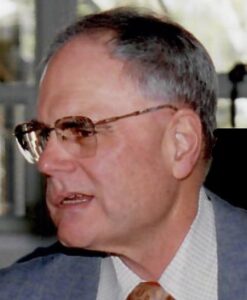
Markley Roberts is a retired journalist and Ph.D. economist living in Washington, D.C.
Converted by My Father? Converted by the Ogburns?
In the summer of 1950 I was a college student bicycling around England. That, of course, included a mandatory visit to the birthplace of “Shakespeare,” Stratford-upon-Avon.
Surprise and chagrin came to me when I went into the Stratford church with the bust of Shakespeare with his bland face, his hands on a sack of grain, and doggerel verse ending “…curst be he that moves my bones.”
I later discovered that the “retired Shakespeare” was a self-serving, profiteering grain merchant who gouged his Stratford neighbors during famine times.
In spite of my youth, I knew that this was not the author of Romeo and Juliet, Hamlet, Lear, and Macbeth, but for the next seven years I was too self-centered with my Washington DC newspaper work and politics to worry about who was the true Shakespeare author.
In 1957, my father — then a professor of history and humanities in Beirut, Lebanon — started writing to me about his exciting exposure to the 1952 book by Dorothy and Charlton Ogburn, “This Star of England: ‘William Shake-speare’ Man of the Renaissance,” and its hero, Edward de Vere, 17th Earl of Oxford (1550-1604).
My first reaction was that it was a harmless diversion so I did not take my father’s conversion seriously. But soon thereafter, entirely by chance, browsing in the book review office of the Washington Star Newspaper, I came upon an earlier 1947 book, only 57 pages long, by Dorothy and Charlton Ogburn, “The Renaissance Man of England,” about de Vere — Oxford.
I was immediately converted by Dorothy Ogburn’s passionate, persuasive prose, but I had been prepared by my father’s continuing support and arguments based on the Ogburns’ 1,300-page 1952 book which I then read very carefully.
When my parents retired to Princeton, New Jersey, in 1959, Dorothy Ogburn wrote to my father:
“You are in a hotbed of obscurantism in Princeton — one of the worst, alas. Mais nous allons changer tout cela. I feel more optimistic now.”
My father started visiting the Ogburns at their Washington Square home in New York City. I joined him on three occasions when I came up from Washington.
Strong personal rapport and shared enthusiasm for the cause of Edward de Vere made these visits a delight for me and my father, then in his 70’s. Charlton, then somewhat frail, died in 1962 at the age of 79 after a jam-packed life — Mercer University, Harvard Law School, lawyer for the American Federation of Labor in the 1930s, advisor to international banks in New York and Paris, bar association service on marriage and divorce, and much else before writing with his wife, Dorothy, their massive, heavily documented, 1,300-page tome on de Vere-Oxford.
Dorothy Stevens Ogburn — the lead author of both the 1947 and the 1952 books — was an experienced writer. In the 1930’s she wrote three mystery novels. She claimed the experience helped her sift and judge evidence in the Shakespeare identity controversy.
The Ogburns’ son, Charlton, Jr., was the prolific author of more than 13 published books before he produced his 890-page 1981 book, “The Mysterious William Shakespeare: The Myth and the Reality.”
Charlton Jr. noted “immeasurable gratitude” to his parents and to his wife, Vera, who double-checked 1,500 citation footnotes in the six-year production of his 1981 Shakespeare book which also contained a 16-page “Chronology of the Principals in the Case of William Shakespeare” and a 10-page bibliography.
In 1966 I happily married Jeanne Addison, a professor of literature at American University, a frequent scholar at the Folger Shakespeare Library, and 1984 President of the Shakespeare Association of America. I take pride in her 1998 award for “Career Achievement in Letters” from the South Atlantic Association of Departments of English. She also received a 2010 award from the Folger Shakespeare Library for “outstanding contributions to the innovative teaching of Shakespeare in American classrooms.”
However, the identity of Shakespeare was a subject we agreed not to discuss. Jeanne did not question the Stratford claim, but, fortunately for me, her scholarly work did not involve identity issues. I know she took some joshing about my Oxford belief but our marriage survived.
In 2004 Jeanne started a Shakespeare discussion group at a private club in Washington. Ten years later a break-away group started the Shakespeare Authorship Inquiries Group. Although most members of the Inquiries Group were Oxfordians, the group was open to all theories of Shakespeare’s identity. The first chair of the Inquiries group was Gareth Howell. The current chair is Bob Meyers.
One extraordinarily important speaker at the Inquiries group has been Roger Stritmatter. His examination of marked passages in de Vere’s Geneva Bible (owned by the Folger Shakespeare Library) shows striking correspondences between Bible passages marked by de Vere and similar lines in the works of Shakespeare.
A fringe benefit from my interest in de Vere-Oxford was an interest in the reign of Queen Elizabeth (1559-1603) and Renaissance England. After I retired in 1996, I gave a course for 10 years at the Washington Osher Lifelong Learning Institute on Queen Elizabeth’s England. That led me to discover a lesser known fact about the Earl of Oxford: in the year before the 1588 Armada, he paid for the construction and equipping of a ship to fight the expected Spanish fleet.
In retrospect, I am grateful to both my father and to the Ogburns for opening my mind to accept the Shakespeare identity of Edward de Vere, 17th Earl of Oxford.


